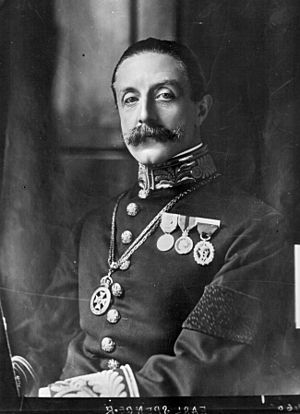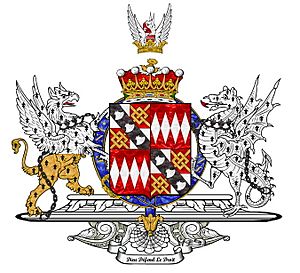Charles Spencer, 6th Earl Spencer facts for kids
Quick facts for kids
The Earl Spencer
|
|
|---|---|
 |
|
| Lord Chamberlain of the Household | |
| In office 18 December 1905 – 14 February 1912 |
|
| Monarch | Edward VII George V |
| Prime Minister | Sir Henry Campbell-Bannerman H. H. Asquith |
| Preceded by | The Earl of Clarendon |
| Succeeded by | The Lord Sandhurst |
| Personal details | |
| Born | 30 October 1857 St James's, Westminster, London, England |
| Died | 26 September 1922 (aged 64) St James Place, Westminster, London, England |
| Political party | Liberal |
| Spouse |
Hon. Margaret Baring
(m. 1887; died 1906) |
| Children |
|
| Parents |
|
| Alma mater | Trinity College, Cambridge |
Charles Robert Spencer, 6th Earl Spencer (born October 30, 1857 – died September 26, 1922) was an important British politician and courtier. He was a member of the famous Spencer family.
He was known as The Honourable Charles Spencer until 1905. From 1905 to 1910, he was called Viscount Althorp. He served as a Member of Parliament (MP) from 1880 to 1895 and again from 1900 to 1905.
From 1905 to 1912, he held a very important job called Lord Chamberlain. This role involved managing the royal household for the King. He worked under two Prime Ministers, Sir Henry Campbell-Bannerman and H. H. Asquith. In 1910, he became the Earl Spencer after his half-brother passed away. He was married to Margaret Baring.
Early Life and School
Charles Robert Spencer was born in St. James's, Westminster, London. People often called him "Bobby." His father was Frederick Spencer, 4th Earl Spencer. His mother was Adelaide Seymour.
His older half-brother was John Spencer, 5th Earl Spencer. Charles went to school at Harrow. He then studied at Trinity College, Cambridge University.
His Political Journey
Charles Spencer was a Member of Parliament (MP) for different areas in Northamptonshire. He represented Northamptonshire North from 1880 to 1885. Then he represented Northamptonshire Mid from 1885 to 1895. He was an MP for that area again from 1900 to 1905.
From 1892 to 1895, he served as the Vice-Chamberlain of the Household. This was another role helping manage the royal household. He was also a "Liberal whip" from 1900 to 1905. A whip helps make sure members of their political party vote together.
In 1905, he was given the title of Viscount Althorp. This allowed him to become Lord Chamberlain in the new Liberal government. His older brother was still Earl Spencer at this time. However, his brother was older and had no children. So, it was expected that Charles would become the next Earl.
On August 13, 1910, he became the Earl Spencer. This happened after his older brother, John Spencer, 5th Earl Spencer, passed away. Charles continued to be Lord Chamberlain until 1912. He also served as the Lord Lieutenant of Northamptonshire from 1908 to 1922. This role represents the King or Queen in a county.
He received several important awards for his service. In 1911, he became a Knight Grand Cross of the Royal Victorian Order. In 1913, he was made a Knight of the Garter. This is one of the highest honors in Britain. He also received other awards from different countries.
His Family Life
Lord Spencer married the Hon. Margaret Baring on July 23, 1887. She was the daughter of Edward Baring, 1st Baron Revelstoke. They were married at St James's Church, Piccadilly.
They had six children together:
- Lady Adelaide Margaret "Delia" Spencer (1889–1981)
- Albert Edward John Spencer, 7th Earl Spencer (1892–1975)
- Hon. Cecil Edward Robert Spencer (1894–1928)
- Lady Lavinia Emily Spencer (1899–1955)
- Captain Hon. George Charles Spencer (1903–1982)
- Alexandra Margaret Elizabeth Spencer (1906–1996)
Sadly, Viscountess Althorp passed away in 1906. Lord Spencer himself passed away in September 1922. He was 64 years old. He had been unwell for several months. His oldest son, Albert, became the next Earl Spencer. Lord Spencer was buried next to his wife in Great Brington, Northamptonshire.
Coat of Arms
 | John T. Biggers |
 | Thomas Blackshear |
 | Mark Bradford |
 | Beverly Buchanan |


